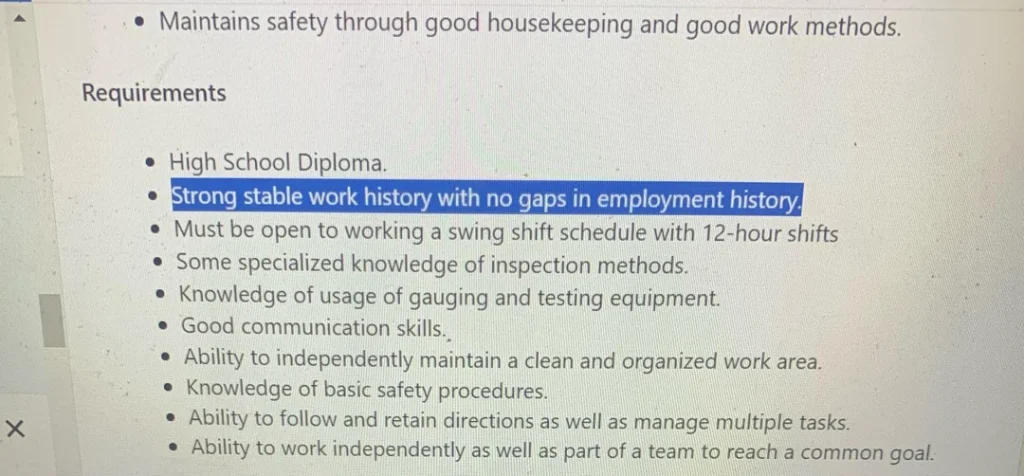
“A lie that is half-truth is the [greatest] of all lies.”
– Alfred Tennysone
Employment gaps, often seen as blemishes on an otherwise steady career trajectory, can raise red flags for potential employers and present a significant challenge for job seekers. While this seems ludicrous and unreasonable, most recruiters are either incompetent or awash in job applications, so it’s easy for them to look for excuses such as a gap to filter you. Despite the legitimate circumstances that may lead to these gaps, they can inadvertently create hurdles in the hiring process, as they may be misinterpreted as a lack of commitment or continuity.

We present various options to steer clear of employment gaps, and help you better think about how to address these in interviews or your resume. If you choose to lie about the dates (or completely fabricate a past employer altogether), we’ll also explain how you can effectively lie and still pass the verification check.
Do Not Give Excuses

While a month or two gap is not likely to get you flagged, longer than two months is a very different matter.
The problem is that most career advice and interview help assumes recruiters are intellectuals, who are analyzing each candidate, weighing pros/cons, and carefully considering how that candidate fits into the organization. Now ask yourself this – of all the recruiters you’ve met, how many strike you as intellectuals and “professional culture fit” analyzers?
The fact is, your resume is probably being read by an untrained 23 year old, and then sent to a junior recruiter, who then spends about 45 seconds deciding whether to interview you. And then, in the interview, you are one of 12-15 interviews for the day, and the recruiter is listening for red flags or reasons to screen you out of the process. At the senior recruiter level, or the hiring manager level, they are likely to spend more time thinking about the logic of your “Gap Excuse”, but at the end of the day most hiring managers recruit based on their gut feel and how much leadership you are showing in the interview. Providing someone with a well-thought excuse just rubs most interviewers the wrong way, even if it’s a completely reasonable excuse.
No matter how “logical” the explanation, you will simply never be as good as someone with no gap.
For more information about excusing your employment dates, read here.
Extending your Employment Dates (Lie!)
We recommend extending your employment dates so that there is no gap whatsoever. Here is what magically gets solved for you when you lie about your dates:
- No need to ever admit you were fired or laid off – you simply left for a better opportunity
- No need to make any excuses or practice a speech about your gap
- Employers are less likely to think that the candidate is unemployable – “Why did this candidate have to wait so long to get employment – what have others seen that I have not?”
- Hiring managers are less likely to require reference checks (they will sometimes pop the reference question when they have concerns about your candidacy, even if their concerns are idiotic)
- No need to address a perceived lack of commitment to working, skills obsolescence, and other stigmas
Want to make resume screeners, junior recruiters, and hiring executives think that you are highly sought after, eager to work, and one of the best applicant fits they have ever interviewed? Then you need to embrace your self-interest for the betterment of your career, and lie where you need to. Senior executives do this all the time, such as this recent NFL example. If you feel “guilty” about lying, I recommend you review our stance on how ethics in business are always different than ethics in your personal life.
In order to extend your employment dates and still pass the background / reference check, you just need a someone to pose as a staffing company, and then use that reference to cover for your extended dates. This can be done with people you know, or there are services available to help you. The way this is works is that you are hijacking the tendency of companies to hire employees through 3rd party staffing companies – which means they are doing employment verifications already through that 3rd party… not your direct employer. Read our posting about fabricating work experience to learn about this.
Fabricating education is completely different, see our advice here.
Not Recommended: Using Years instead of Months

Common career wisdom for candidates seeking to hide a gap of employment, is to replace the MM/YY format on dates with just the year.
Do not use years only. This is an immediate flag for recruiters that the dates are being fudged, and even if you aren’t fudging, they will always assume that you are. Remember – recruiters hire and interview based on dumb reasons, but never treat them as stupid. They know all the games that you know, when it comes to manipulating employment gaps, and in a competitive market, that could be enough of a justification to throw you out of consideration.
Therefore, you should always use Month and Year, to appear fully transparent. Does that mean that you cannot lie or manipulate the recruiter? Absolutely not! You just need to be more clever.
